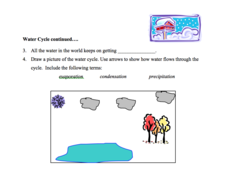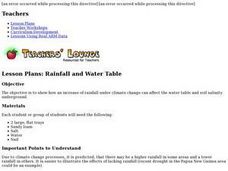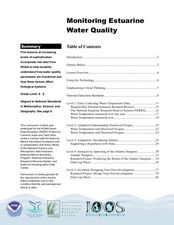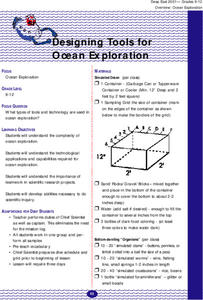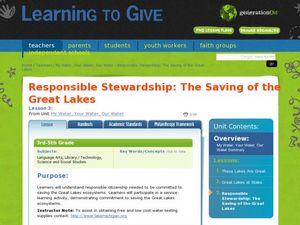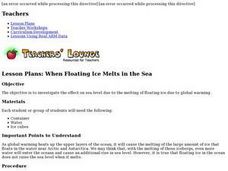Curated OER
Water, Water Everywhere!
Learners brainstorm on ways they use water, and where water comes from. They view video, Down the Drain, to gain specific facts about water use, properties of water, problems of water and the water cycle. They perform a lab activity...
Curated OER
Water Quality and Environmental Pollution
Learners use litmus paper to begin to discover the qualities of acids and bases. They learn about pH by testing clear liquids for acidity with purple cabbage juice as an indicator. The video Streamkeeper, with Bill Nye, and other video...
Curated OER
Rainfall and Water Table
Through inquiry, experimentation, and observation, young scientists see how an increase in rainfall under climate change can affect the water table and soil salinity underground. Young scientists build models that represent the...
Curated OER
Water, Water, Everywhere!
Students complete a WebQuest. In this water cycle lesson, students investigate the cycle through a WebQuest activity. Students research the water cycle through Internet resources and create a documentary video of their process.
Curated OER
Dissolved Gases in Water
Using different types of water, earth science explorers set out to prove the ocean's ability to absorb greenhouse gases. They shake, heat, and freeze the water samples to examine gas content. This lesson is useful during a unit...
Curated OER
Making Clouds
In collaborative groups, mini-meteorologists investigate the conditions that must be present for clouds to form: cooling air, water vapor, and condensation nuclei. In addition to procedures, a chart for observations and some follow-up...
Curated OER
Designing Tools for Ocean Exploration
Students explore the complexity of ocean exploration and the technological applications and capabilities required for ocean exploration. They consider the importance of teamwork in scientific research projects.
Baylor College
Tools of Magnification
Life science learners need to be able to use a microscope. With this comprehensive resource, they first experience how lenses and magnification work, and then get familiar with using a compound microscope. Tremendous background...
Curated OER
Monitoring Estuarine Water Quality
Students analyze water quality data from real data. In this environmental science instructional activity, students examine how salinity and dissolved oxygen affect the living organisms in the estuary. They interpret graphs to support or...
Purdue University
Design of an Earthen Dam for a Lafayette Neighborhood
How do dams support bodies of water? Scholars engage in a hands-on STEM activity where they design, build, and test dams to learn about bodies of water and how humans use natural resources. They learn how criteria and constraints affect...
NOAA
Seafood and Human Health
Whether your young biologists realize it or not, humans play a significant role in marine ecosystems. To help them understand this fact children first create graphical representations that show homo sapiens' place in marine food chains,...
US Department of Energy
Sunlight and Evaporation
Here is a simple inquiry experiment designed to demonstrate that the energy from sunlight can evaporate water. Young scientists follow provided procedural steps to construct a model of our atmosphere using a bowl, a cup, water and...
Curated OER
Aquatic Exotics
Students identify and describe the aquatic exotic species found in Illinois. Using the internet, they research the species origins and discover their effects on native species in the area. They discuss how appropriate it is to introduce...
Curated OER
Analyzing the Relationship between Snowpack and River Flow
Learners use the Internet to research current and past snowpack levels and river gauging station readings. They determine the relationship between snowpack and river flow. They predict future river flow.
Curated OER
Devising a Set of Experiments to Test Water for Dissolved Substances
Students work together to test water samples for pollutants. They design data tables to collect and record their observations. They complete discussion questions to end the lesson.
Curated OER
Sea Water and Agriculture
Young scientists examine how even a small rise in sea level can lead to salinisation of valuable agricultural land. First, everyone takes part in a simple demonstration which shows the negative effects salt water has on plants. Peer...
Curated OER
Designing Tools for Ocean Exploration
Students research the methods and tools used in ocean exploration. They, in groups, simulate an ocean exploration and consider what tools facilitate the exploration's objectives.
University of Georgia
Heating and Cooling of Land Forms
Compare heating and cooling rates of different land forms. A lab activity has groups collect data on the rate of heating and cooling of soil, grass, saltwater, fresh water, and sand. An analysis of the rates shows how the different land...
Curated OER
Finding the Way
Students identify and research navigational tools used in deep sea explorations. They are introduced to a compass, the Global Positioning System and sonar technology and then describe their uses in underwater exploration.
Curated OER
Pooper Scooper
Science Students build a pooper scooper tool that helps them clean up after a dog without getting their hands dirty or their noses too close. They research the diseases that can be transported through animal waste and work in teams to...
Curated OER
Responsible Stewardship: The Saving of the Great Lakes
Students devise a plan to protect the Great Lakes. In this environmental lesson, students conduct research to identify nonprofit groups that help protect the waterways. Students write letters to the Congressman or a nonprofit...
Curated OER
When Floating Ice Melts in the Sea
With this simple inquiry exercise young scientists observe the effects of melting ice on water level. Set up an easy experiment with floating ice cubes in a dish of water then have your pupils make and record their observations of the...
Curated OER
Outgassing
Young scholars demonstrate the concept of outgassing and to explain the origins of the earth's atmosphere. They perform a simple experiment using glass jars, two antacid tablets, and some water. This experiment does a good job in...
Curated OER
Rate of Coral Growth
Using a table of information provided, middle school marine biologists chart data on a graph to determine the impact of water depth on coral growth in Australia's Great Barrier Reef. Then they answer questions that connect the data to...


